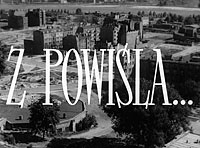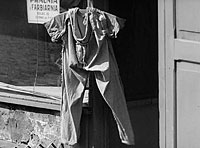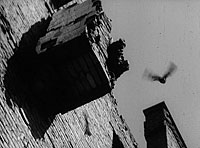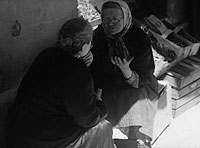 Z Powiśla…
Z Powiśla…
Poland, 1958, black and white, 10 mins
After making short films at the Łódź Film School (among them Day In Day Out/Jak co dzień…, 1955) and collaborating with Władysław Ślesicki on Where the Devil Says Goodnight (Gdzie diabeł mówi dobranoc, 1956) and People from an Empty Zone (Ludzie z pustego obszaru, 1957), Kazimierz Karabasz made his solo professional directing debut with this lyrical, poeticised portrait of the run-down Warsaw suburb of Powiśle, originally part of a series entitled Walking Around Warsaw (Wędrówki po Warszawie). It touches on a lot of topics familiar from other Polish documentaries – notably the bombed-out ruins from Brzozowa Street (Ulica Brzozowa, 1947), Warsaw ’56 (Warszawa 1956) and Lublin Old Town (Lubelska starówka, 1956) and the topographical concerns of City on Islands (Miasto na wyspach, 1958) – but Karabasz seems completely uninterested in exploring wider social/political issues. Indeed, the commentary here is reduced to mere wisps, and many of Karabasz’ subsequent films would dispense with it altogether.

This is hardly surprising, when one considers the eloquence of Stanisław Niedbalski’s images when married to Zbigniew Jeżewski’s wistful woodwind score (which runs more or less continuously throughout). This combination is first seen in the opening shot, as the camera adopts a high vantage point to pan around the city’s skyline before slowly zooming in to the buildings in Powiśle as the main title comes up on screen. A cat strolls across an otherwise deserted courtyard that is otherwise only populated by cushions. A tap drips aimlessly onto the ground, filling a visibly eroded dimple, and a small girl carries freshly-filled bottles of water (one of many simple, unforced images of children that pepper the running time). The music swaps woodwinds for a barrel-organ, and the soundtrack becomes diegetic, as an elderly man sets up in the courtyard and cranks old folk tunes out of it. The apartment block’s windows are mostly open, but there’s no visible sign of any appreciation.

In the commercial centre of Powiśle, Karabasz and Niedbalski seem as interested in a passing dog, a flock of pigeons or a pair of children’s overalls hanging outside a shop window, than they do in human passers-by. The music is occasionally interrupted by the sight and sound of a train passing on an overhead line, which the narrator highlights as the only visible means of counting the hours. A woman yawns and shields her eyes from the sun. A man pulls a heavy cart by himself, his female companion merely steering it. Two elderly women gossip, one grabbing the other’s wrist to emphasise a point. Patients in the Solec hospital sit on the balcony and look aimlessly out into the distance – one watches a blonde woman as she leans out of the window of one of the trains, a fleeting connection with the outside world.

Powiśle, according to Karabasz, seems frozen in time, though not in a way that seems especially attractive or useful to nostalgists. Several decades ago, an unnamed writer claimed that no other part of Warsaw had so much charm and ambience, but Powiśle was bombed almost flat during the Uprising of 1944 – this is dealt with obliquely, presumably because Karabasz assumed that a contemporary Polish audience wouldn’t need the details spelt out a mere fourteen years after the events. The signs of daily life amid the ruins recall similar images in Brzozowa Street, though the effect is inverted: instead of life thriving among the rubble, here narrator idly muses on why anyone would want to live in Powiśle when other parts of Warsaw are clearly more appealing.
Somewhat anthropomorphically, Karabasz attempts to ascribe human characteristics to Powiśle: it’s been “badly wounded”, and is “lonely”. City on Islands had a similar concern for the character of its locations, but Karabasz is more interested in poetry than polemic. His quiet, understated film is in sharp contrast to the stridency of many of the other documentaries in the so-called “black series”, but it points the way towards a far more lyrical approach to documentary that would burst into full flower with Karabasz’s masterpieces of the early 1960s (The Musicians/Muzykanci, People on the Road/Ludzie w drodze, both 1960), other films that show rather than tell, evoke rather than explain.
- Director/Script: Kazimierz Karabasz
- Camera: Stanisław Niedbalski
- Editor: Helena Białkowska
- Sound: Halina Paszkowska
- Music: Zbigniew Jeżewski
- Narrator: Tadeusz Łomnicki
- Production Manager: Jerzy Dorożyński
- Production Company: WFD
The film is included on PWA’s Polish School of the Documentary: The Black Series double-DVD set (Region 0 PAL). The source print is generally in good physical condition, though occasional exposure fluctuations cause the picture to flicker slightly, and there’s a modicum of minor surface damage. The soundtrack is fine by 1950s mono standards, with the music coming across well. Subtitles are generally easy to follow, the occasional typo notwithstanding – though the phrasing is occasionally somewhat awkward and there’s a jarring bit where the line “Ruiny jak rdza wżerają się w życie z tępym, milczącym uporem” is translated by the subtitles as “On each step, the ruins bite the life like rust, with dull, silent obstinacy” but in the booklet as “Like rust, the ruins come to life with dull and silent obstinacy.”